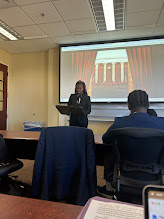Today the court was presented with the case of Plessy v. Ferguson. The facts agreed by both parties include that Louisiana state law stated all private corporation railroads must provide separate accommodations for white and African American citizens. Homer Plessy, a known African American, bought a first class ticket. He was taken off the train, arrested and fined. The lawyers on the side of Plessy want this law struck down in its entirety, making a claim under the equal protection clause of the 14th amendment.
The first party to speak was the lawyers on the side of Homer Plessy. The lawyers argued that segregation was a system built to keep African Americans from being able to have full citizenship. They argued that unfair institutions of the past should be destroyed to allow African Americans to move forward.The lawyers on the side of Plessy had a strong biblical argument, referencing Genesis 1:4 and Galatians 5:3 to express the point that we were all created equally by God to humbly serve each other and God. The biblical argument was also made that God did not intend for us to be separated, but that the idea of segregation came into the world alongside our sin. We were also reminded in the biblical argument that Homer Plessy is only 1/8 African American.
The impact segregation has on the economy was made clear to us as we were urged to consider the way taxpayers must pay double for infrastructure due to the need of creating two buses, two schools, and two restrooms simply to ensure segregation continued. The argument was made that the funding we are spending to ensure segregation continues could be used to fund other efforts.
We also heard a cultural argument on the side of Plessy stating that cultural exchange between African Americans and whites would lead to shred benefits. It was pointed out to us that segregation suggests African American traditions are not as important as their white counterparts.The last perspective given on the side of Plessy was that of the law. We were pointed to both the Constitution and Declaration of Independence as it was pointed out that Africans Americans life, liberty and pursuit of happiness are being threatened by segregation. Ultimately, this case is an issue with the 14th amendment so we were pointed to the equal protection clause stating that no state shall deny a person equal rights.
The second party to speak was that on the side of the state, what is now referred to as Ferguson. We were pointed to Romans 3:1 which points out the importance of respecting authority and laws put in place. We were also told that the separate but equal doctrine gives all individuals access to their needs while also helping to avoid conflict in the streets.
The State of Louisiana made a strong economic argument citing Black Wall Street in Galveston, Texas as evidence that one side is not more economically well off than the other. It was argued that integration would cause tension which could scare off customers and would ultimately be bad for businesses. Stark change puts the state at risk of economic collapse which is not necessary.The state urged us to consider that social order and harmony are only possible if cultural norms and traditions are upheld. We were told that Jim Crow laws are not rules of discrimination, but simply a reflection of the traditions of the time. It was pointed out that relations of different races have always been a sore subject, so it is in the main interest of both races to live harmoniously separated lives. We were told segregation is not meant to take down African Americans, but it gives them a way to continue to live out their different customs and ways of life.
The biblical argument on the side of the state was given referencing Deuteronomy 32:8 and Leviticus 19:19 to push the argument that according to divine order each race has its own place and purpose. We were told that the cure on Ham's descendants in Genesis 9:20 is what forced the African Americans into a life of servitude. The state believes that integration would deny the will of God and go against divine judgement.The law argument on the side of the state argued that federal law should not intrude on the rights of the states. Each state has different cultural needs, so there should not be a one size fits all law from the federal government concerning segregation. The argued that segregation was standard and fit alongside the Constitution as long as the amenities were of equal value and met the same standards.
While there were strong arguments made on both sides, Judge Smith ruled on the side of Plessy. The decision was based on the 14th amendment and the evidence that the state was not being as neutral as they wanted the court to believe. The state of the separate railroads was determined to not be equal, hence the judgement on the side of Homer Plessy.




No comments:
Post a Comment